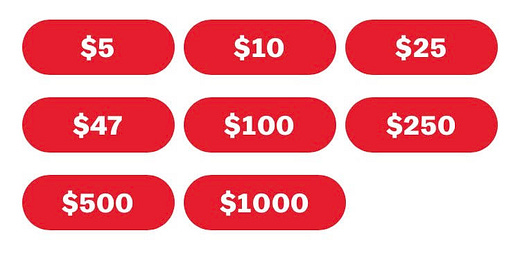

Lewis Cass, the losing Whig candidate for president in 1848, chose “The Sub Treasury and the Tariff of ‘46.” The failed incumbent of 1912, William Howard Taft, went with “It is nothing but fair to leave Taft in the chair.” Republican Alfred Landon opted for “Let’s Make It a Landon-Slide” in 1936 in the process of achieving the largest landslide in presidential history – it’s just that it was against him. A slogan isn’t responsible for a losing or winning campaign – Franklin Pierce won with "We Polked you in '44, We shall Pierce you in '52" – but slogans can be pretty good at representing the reasons why a campaign loses or wins. (Or, in the case of “Jeb!”, why it will become a meme).
A slogan is not only the campaign’s most visible and repeated message, it also represents the sum of what a party apparatus believes to be most strategic to be that central message. It says something about what the campaign stands for, but also how the campaign understands campaigns.
At the time when I first heard the slogans of the Kamala Harris campaign – alternately styled as “Let’s Win This” and “When We Fight, We Win” and “Together, We Can Win” – I drafted and deleted multiple attempts to explain what exactly about this approach was making my brain short-circuit. Although three weeks after the election loss could seem an odd time to revisit them, I was prompted today to think about how elementally they represent the worst tendencies of this Democratic party and the continued need to identify and eliminate that paradigm. These slogans represent the failure of Harris and the party to have a story about what’s happening in this country.
This isn’t a unique critique now or during the campaign, but two podcast episodes today provided a perfect outline of this problem. First, on on The Ezra Klein Show today, Faiz Shakir repeatedly returned to the “hunger” that the public has for “a basic story” about what’s happening around them. Shakir was Bernie Sanders’ 2020 campaign manager, in addition to having worked for Harry Reid and Nancy Pelosi, and he offered what it would look like to actually do this:
We’re going to not only talk about policies but we have to tell you a story about America’s economy. It starts with it being rigged against you. It talks about how hard it is as a middle class person right now to afford college to pay for child care.
While you are struggling to make it on a middle class life. There are people in the society who are doing quite well with their passive income. Making tons of money, finding ways to rig this economic system to benefit them. And our job in life as public servants, our job as candidates who want to own some authority within government, is to fight for you.
Telling a story – one that identifies who’s hurting, who’s at fault, and what we can do about it – offers voters both a connection to a candidate and a role in elevating that champion:
But I do think it starts with a theory of: What am I seeing in this economy? So that you don’t feel like you live in a different world than I do. I live in the same world that you do.
I see what you’re going through, and now I’m going to connect it to why I want to serve. And that just fundamental framework that we just talked about is not a principal way in which I hear a lot of Democrats thinking about how to campaign.
Donald Trump’s story to voters is exceptionally clear: I see that you are hurting. You are hurting because Democrats are letting in people from other countries that are coming here and hurting you. I’ll fix things by getting rid of the immigrants. Even this cycle’s grotesque anti-trans ad blitz was hooked on the double meaning that Harris is only looking out for “them,” the others, strangers. “Make America Great Again” synthesizes this. It is about action and direction; it is about a specific Americanness; it is about some kind of improvement from the status quo. It is meaningful that Trump attempted “Keep America Great” in 2020, before returning to “Make America Great Again” in 2024.
As for the story told by the Harris campaign? Whatever it was, it should have been evident as top campaign staff from the Harris campaign appeared on Pod Save America today for their post-mortem on “What Went Wrong.” The guests were campaign manager Jen O’Malley Dillion, deputy campaign manager Quentin Fulks, communications head Stephanie Cutter, and consultant David Plouffe (although they are all, otherwise, also consultants). Words that did not appear in this conversation a single time: worker, labor, union, jobs, corporations, companies, inequality, billionaires. The middle class was mentioned once; “debt”came up three times, but that was only in reference to the fact that the DNC will not be in debt from this campaign. Plouffe might respond that they did mention the “economy” 21 times in this interview – which would be exactly helpful to note that “the economy” is not a tangible concept to any average person. Trump, however, was mentioned 132 times; of the 29 mentions of Republicans, most were about how the campaign tried to win them over.
To the extent that the Harris campaign did have a story, it couldn’t have one that recognized any current problem because doing so would require her to blame Biden, something she was unwilling to do. Another possibility could have been to blame those outside of government, but any otherwise viable option there wouldn’t work for a Democratic party that’s decided to embrace big money in politics. What remained was to eschew blame in favor of positivity, or to make Trump the possible-causer-of-future-problems.
And that is the kind of murkiness, void of conviction, and missing plot that produces a fitting tagline: “Let’s Win This.” It’s about winning because the problem is Trump, rather than the material hardships or psychic dissatisfaction across America. The stakes (“this”) are an election – a process – rather than the country, the real place where people live. And the way we’re going to win, which will mean that we achieved…winning? Someone is going to let us. Whoever “us” is, anyway.
This slogan reflects not just the inadequacy of the campaign’s message, but the nature of how this Democratic party runs campaigns. For the consultants and staff behind these decisions, elections are fundamentally a sport between two teams. The consequence of “being sad about losing” is far more salient than the consequences of gutted social programs, mass deportations, or attacks on workers rights. That can also apply to the people they are increasingly messaging to – high-information, college-educated voters – who don’t need much convincing or informing beyond what they’ll look up themselves. The party understands campaigns as a microtargeting game of margins, not a vehicle for movement-building and social transformation. All of the rhetorical focus on winning, and so little on what we’re actually trying to win.
Harris didn’t lose because of her slogans and she didn’t lose in a landslide (and definitely not a “Landon-slide”). But the reasons her slogans were what they were are the reasons that Democrats will keep losing if they don’t find a legible story to tell the public. Whether they do that will, in large part, depend on which of the operatives on these two podcast episodes get their way in the next four years. Talk about a democratic party! Actually, I’ll save that one for another time.



